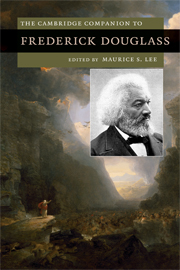Book contents
- Frontmatter
- Introduction
- 1 Douglass’s Self-Making and the Culture of Abolitionism
- 2 Identity in the Autobiographies
- 3 Douglass as Orator and Editor
- 4 Crisis and Faith in Douglass’s Work
- 5 Violence, Manhood, and War in Douglass
- 6 Human Law and Higher Law
- 7 Sentimental Douglass
- 8 Douglass among the Romantics
- 9 Douglass’s Black Atlantic: Britain, Europe, Egypt
- 10 Douglass’s Black Atlantic: The Caribbean
- 11 Douglass, Ideological Slavery, and Postbellum Racial Politics
- 12 Born into Slavery: Echoes and Legacies
- Guide to Further Reading
- Index
5 - Violence, Manhood, and War in Douglass
Published online by Cambridge University Press: 28 July 2009
- Frontmatter
- Introduction
- 1 Douglass’s Self-Making and the Culture of Abolitionism
- 2 Identity in the Autobiographies
- 3 Douglass as Orator and Editor
- 4 Crisis and Faith in Douglass’s Work
- 5 Violence, Manhood, and War in Douglass
- 6 Human Law and Higher Law
- 7 Sentimental Douglass
- 8 Douglass among the Romantics
- 9 Douglass’s Black Atlantic: Britain, Europe, Egypt
- 10 Douglass’s Black Atlantic: The Caribbean
- 11 Douglass, Ideological Slavery, and Postbellum Racial Politics
- 12 Born into Slavery: Echoes and Legacies
- Guide to Further Reading
- Index
Summary
In a March 1978 address at Goshen College in Goshen, Indiana, the late John H. Yoder, distinguished Christian theologian and radical pacifist, publicly decried the nuclear arms race “as one of the simplest analogies to the monster language of the Apocalypse.” He called the language of apocalypse “right” in describing the extraordinary threat of the age. “The problem is still one,” he said, “that fits the apocalyptic language of dragons and angels and the sky falling down. This is a better description of what we are up against.” The fitness of apocalyptic language to the imagined prospect of nuclear annihilation was no other worldly abstraction to Yoder. Nor was it spiritualistic theologizing. Instead, Yoder understood Apocalypse to offer “a way of talking critically about this world.” He saw in the state of global affairs an untold irruption in history in the offing. More than a century earlier, Frederick Douglass shared a similarly critical vision of the state of US affairs concerning slavery and the war to defeat its interests. Like many others, North and South, Douglass discerned something millennial in the approaching Civil War. Like few others, however, Douglass slowly felt himself elected to the hastening of “the America apocalypse” with full confidence in its emancipatory ends. This chapter is about the evolution of Douglass’s thought and actions from 1845 to the Civil War regarding the serviceability of war and violence to the politics of abolition and freedom. It shows how Douglass transformed a platform of Christian pacifism into one of holy violence by deploying a sociology of manhood and a theology of political radicalism better suited to the task of making the history Douglass seems to have been, everywhere and at all times, intent upon.
- Type
- Chapter
- Information
- The Cambridge Companion to Frederick Douglass , pp. 73 - 88Publisher: Cambridge University PressPrint publication year: 2009
- 23
- Cited by

